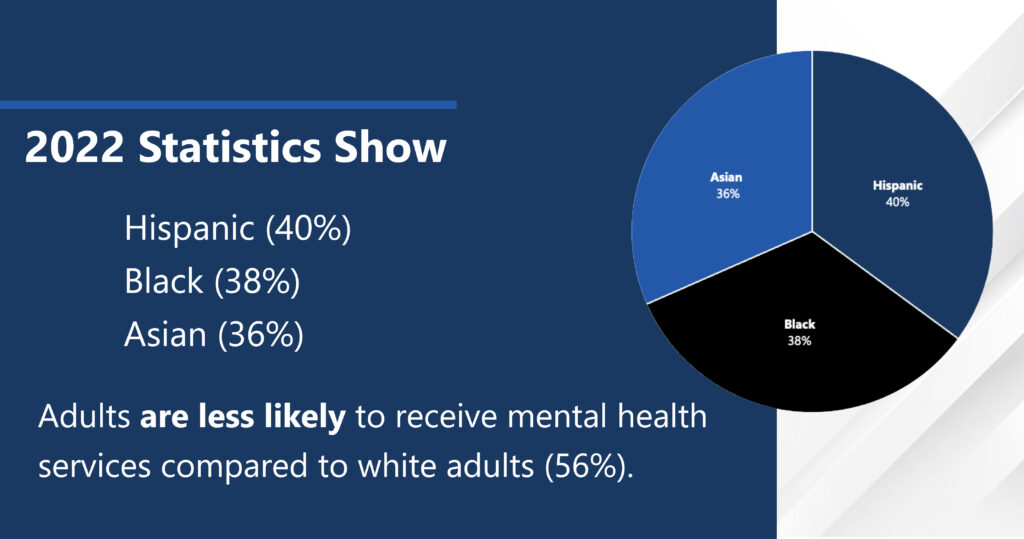Championing Minority Mental Health: Reflections and the Road Ahead
Let’s have a conversation
Reflecting on National Minority Mental Health Awareness Month in July, it’s a time to focus on the unique mental health challenges faced by underrepresented minority communities. Mental health encompasses emotional, psychological and social well-being, affecting how individuals think, feel and act. It also plays a crucial role in managing stress and making informed decisions1. Effective mental health care is essential for helping people navigate life's challenges and stresses.
Minority mental health emphasizes improving outcomes for racial and ethnic minority populations by addressing the effects of Social Determinants of Health (SDOH) on mental well-being. These communities often face significant disparities, including higher rates of suicide attempts among adolescents and lower treatment rates for conditions like depression among adults2. By acknowledging these unique challenges, efforts can be made toward providing more equitable mental health care.

The Critical Need for Minority Mental Health Awareness
With over 40% of the U.S. population identifying as Black, Indigenous and People of Color (BIPOC), addressing the mental health needs of these communities is essential3. Mental health services are disproportionately less accessible to minority groups, with 2022 statistics showing that Hispanic (40%), Black (38%) and Asian (36%) adults are less likely to receive mental health services compared to White adults (56%)4. In 2020, fewer than half of African American adults received mental health care and in 2018, Asian Americans were 60% less likely to receive treatment compared to non-Hispanic Whites. Factors such as lack of health insurance, limited access to treatment and stigma significantly contribute to these disparities1. Raising awareness about these issues is crucial for advocating better mental health care and support for minority communities.

Promoting Equitable Care with ProspHire
In alignment with shifts in industry trends and government policies, our team is committed to working alongside our clients to promote equitable care that improves access to services to manage mental health and substance use disorders in all their patient populations. Technological and clinical investments in behavioral health disorder identification, treatment and prevention services can help health systems overcome long-standing challenges to providing integrated and comprehensive care for the traditionally hardest-to-reach patients. ProspHire has the responsibility to our clients and communities to enable equitable adoption, marketing and utilization of services to capture those of greatest need. This improves the opportunity for members to see improved health and social-related outcomes and health plans to realize improved quality measure performance in their government programs.
ProspHire has extensive experience in implementing behavioral health tools for Medicaid programs, specifically in areas that address minority and high-risk patient populations. Our experience includes the coordination of vendor relationships for various initiatives, such as applications that address youth mental health, transitional housing for individuals in recovery, sobering centers for those dealing with acute issues and tools for youth managing their transition into adulthood. From initial vendor outreach, contracting and vendor risk assessments to implementation of the product, ProspHire has experience navigating behavioral health program design and implementation from start to finish. Serving as the vendor managers, ProspHire will be with you every step of the way to launch new Behavioral health programs that address patients with mental health and substance use disorders.
Recognizing that access to behavioral health resources remains a significant challenge for minorities facing mental health issues, ProspHire is well-equipped to implement these initiatives within your health plan to promote more equitable care. ProspHire understands that coordination and collaboration with community service organizations and vendors involved in the continuum of care is key to offering a sustainable service model. It is crucial for health plans to address the mental health and substance use disorder needs of minority populations and ProspHire offers proven success in behavioral health that can be leveraged to enhance care delivery at your organization.
- https://www.fda.gov/consumers/knowledge-and-news-women-owh-blog/national-minority-mental-health-awareness-month
- National Minority Mental Health Awareness Month 2024 | Office of Minority Health (hhs.gov)
- https://www.census.gov/quickfacts/fact/table/US/PST045221
- Key Takeaways - Key Data on Health and Health Care by Race and Ethnicity | KFF
© 2025 ProspHire, LLC. All Rights Reserved / Terms of Use / Privacy Policy






